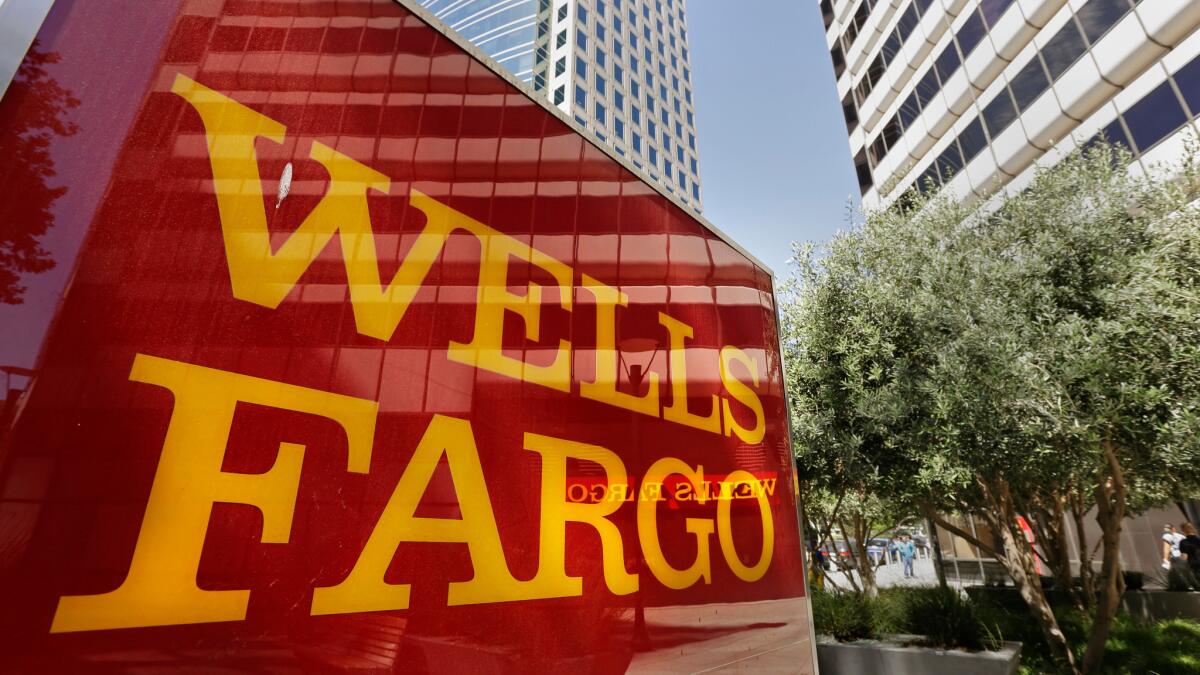Wells Fargo earnings slip, but they mostly meet expectations

- Share via
Consumer banking giant Wells Fargo & Co. said its second-quarter earnings fell 3% from a year earlier as the San Francisco-based bank continues to feel pressure from low interest rates.
On Friday, Wells Fargo reported a profit for the three-month period ended June 30 of $5.56 billion, down from $5.72 billion in the same period last year. That was $1.01 per share, down from $1.03 per share a year earlier.
The results mostly met analysts’ expectations. Analysts surveyed by FactSet had expected $1.01 per share, while 12 analysts surveyed by Zacks Investment Research were looking for $1.02.
“Wells Fargo’s second-quarter results demonstrated our ability to generate consistent performance during periods of economic, capital markets and interest rate uncertainty,” Wells Fargo Chief Executive and Chairman John Stumpf said in prepared remarks.
Wells Fargo continued to grow aggressively and expand its lending in all its businesses, from industrial and commercial loans to credit cards and auto lending. Total loans were up 8% to $957.2 billion.
The nation’s historically low interest rates continue to pressure the bank. Wells Fargo is particularly affected by low rates because it makes much of its profit from loans to individuals and businesses and does not have a significant trading or investment banking operation, unlike other major U.S. banks such as JPMorgan Chase & Co. On Thursday JPMorgan reported better results than analysts were expecting thanks to a big gain in trading.
Wells Fargo’s net interest income rose 4% to $11.73 billion. However, a key measure of profitability — the net interest margin, or how much Wells Fargo made from lending — fell again, to 2.86%.
Low interest rates continue to be good news for Wells’ mortgage business, which is the largest in the country. Mortgage loan originations rose 43% from the previous quarter and 2% from a year earlier, helped by the start of the home buying season and historically low rates.
Wells Fargo also felt pressure from its loans to oil and gas companies, which continue to struggle in the wake of low oil prices. Wells’ charge-off rate, or the percentage of loans it believes are no longer collectible, rose to 0.29% from 0.16% a year earlier. Nearly all of that increase came from Wells’ commercial and industrial loan portfolio, which includes its oil and gas loans.
The country’s biggest mortgage lender posted revenue of $22.2 billion, in line with what analysts surveyed by FactSet were expecting.
Shares of Wells Fargo fell 2.5% to close at $47.71. They have declined about 12% since the start of the year.
ALSO
Lazarus: Britain’s diabetic leader reflects differing healthcare systems
Fox News on-air talent supports Roger Ailes — but where’s Megyn Kelly?
Venture capital deals slow amid doubts about augmented reality’s reach
UPDATES:
1:25 p.m.: This article was updated with additional information.
This article was originally published at 5:15 a.m.
More to Read
Inside the business of entertainment
The Wide Shot brings you news, analysis and insights on everything from streaming wars to production — and what it all means for the future.
You may occasionally receive promotional content from the Los Angeles Times.









